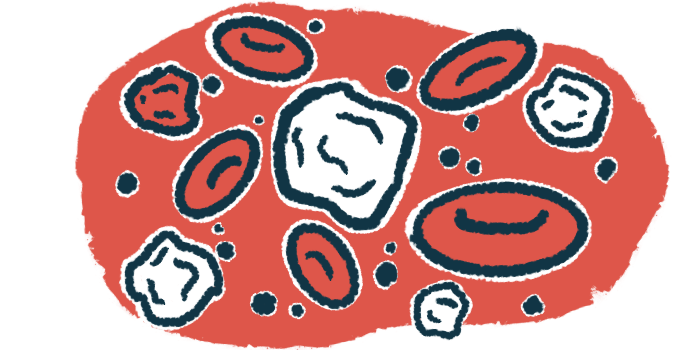Chronic CF lung infections appear to ‘exhaust’ immune system
Study finds lower levels of certain immune signaling proteins in patients' blood
Written by |

The immune system of people with cystic fibrosis (CF) might be impaired due to long-term persistent lung infections and inflammation, a study suggested.
Using a new and noninvasive standardized test for immune function called TruCulture, scientists found a lesser release of certain immune signaling proteins in immune cells from patients’ blood samples relative to samples from healthy individuals, a sign of problems in the workings of immune system.
TruCulture results could not determine likely changes in lung function in CF patients treated with antibiotics for infections, but its measures of immune signaling proteins may be markers of the differences in lung disease progression seen among patients, the researchers noted.
The study, “Clinical implications of innate immune exhaustion in cystic fibrosis,” was published in ERJ Open Research.
Declines in lung health can be rapid or progress slowly with CF
Persistent lung infection and inflammation are among the most significant disease respiratory symptoms facing people with CF, a genetic disease marked by the abnormal buildup of thick mucus in organs like the lungs.
While some patients experience a rapid decline in lung function at a very young age, others can have relatively normal lung function for decades. It’s been suggested that patients’ varying immunological characteristics may explain this difference.
Studying the CF immune system in clinical settings remains challenging, however, because standardized tools have been lacking.
TruCulture is a recently standardized test developed to predict links between systemic (bodywide) immune responses and clinical parameters. It measures the release of immune signaling proteins called cytokines, with and without immune cell stimulation, in fresh whole blood samples.
“To our knowledge, TruCulture has never been used to study the immunological responses in CF,” the researchers, with Copenhagen University Hospital in Denmark, wrote.
Significantly lower rise in stimulated cytokines seen in patients
Blood samples were used to test whether TruCulture could find links between different immune responses and lung function in a two-part study.
One part was a cross-sectional study, which examined 28 patients at one point in time, and the other a longitudinal study, which followed 24 participants over 14 days of antibiotic treatment for lung infections. The group’s median age was 36, and a majority (58%) was male.
Across all patients, two-thirds (67%) had a chronic lung infection with Pseudomonas aeruginosa, a major bacterial contributor to lung disease in people with CF, without other chronic co-infections. Most patients (79%) were using a CFTR modulator therapy.
The release of cytokines from immune cells in the blood was measured before and after stimulation of toll-like receptors, a class of proteins that play a key role in the immune system. Stimulation mimics an immune response in the body to real-world infection, with higher subsequent levels of cytokines reflecting a stronger immune response.
Lung function was assessed by forced expiratory volume in one second, or FEV1, which measures how much air can be exhaled after taking a deep breath.
In the initial cross-sectional study, the release of cytokines was similar between CF patients and a control group of healthy individuals without stimulation. After stimulation, the rise in stimulated cytokines were significantly lower in CF patients than in controls, particularly for IFN-gamma. A markedly lower release of this cytokine was seen in more than 75% of the study’s CF population.
Similar results were seen for other cytokines, including interleukin-12p40, IL-1-beta, IL-6, and TNF-alpha. Moreover, the same pattern was found among patients with and without chronic P. aeruginosa infection. Better lung function also was significantly associated with a higher release of IL-1-beta and IL-6.
Immune system may be exhausted by chronic infection, inflammation
“Our data indicate that the immune system in CF might be exhausted or impaired after long-term persistent infection and inflammation,” the researchers wrote, adding that previous studies show “chronic infections or tissue injury … negatively regulates the [toll-like receptor]-stimulated immune response.”
In the longitudinal study, the researchers measured changes in cytokine release after 14 days of intravenous (into-the-vein) antibiotic treatment for lung infection. In stimulated samples, cytokine release was higher after treatment, with IL-17A and IL-1-beta increasing significantly. In unstimulated samples, cytokine release tended to be lower after treatment, with IFN-gamma and IL-6 declining significantly.
“With a tendency of increased stimulated cytokine release and lower unstimulated release, these changes may reflect a recovering immune system after antibiotic treatment,” the researchers noted.
However, cytokine release before antibiotic treatment didn’t appear to correlate with changes in lung function after treatment. The team acknowledged that a 14-day follow-up time may have been too short.
“Based on our initial findings, TruCulture may not be an optimal clinical tool to predict changes in lung function in [CF],” the researchers concluded. “However, [toll-like receptor]-stimulated cytokine release was identified as a potential marker of clinical variations in CF.”







